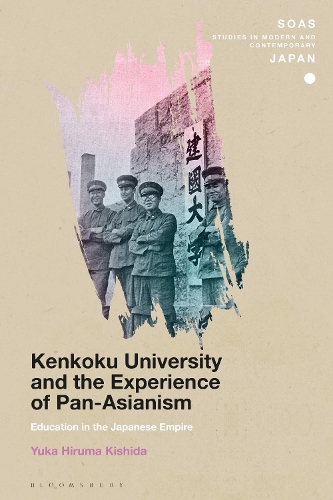
Kenkoku University and the Experience of Pan-Asianism: Education in the Japanese Empire
(Paperback)
Publishing Details
Kenkoku University and the Experience of Pan-Asianism: Education in the Japanese Empire
By (Author) Yuka Hiruma Kishida
Bloomsbury Publishing PLC
Bloomsbury Academic
22nd April 2021
United Kingdom
Classifications
Tertiary Education
Non Fiction
378.511809044
Physical Properties
Paperback
288
Width 154mm, Height 234mm, Spine 18mm
432g
Description
Kenkoku University and the Experience of Pan-Asianism makes a fresh contribution to the recent effort to re-examine the Japanese wartime ideology of Pan-Asianism by focusing on the experiences of students at Kenkoku University or Nation-Building University, abbreviated as Kendai (1938-1945). Located in the northeastern provinces of China commonly designated Manchuria, the university proclaimed to realize the goal of minzoku kyowa (ethnic harmony). It recruited students of Japanese, Chinese, Korean, Taiwanese, Mongolian and Russian backgrounds and aimed to foster a generation of leaders for the state of Manchukuo. Distinguishing itself from other colonial schools within the Japanese Empire, Kendai promised ethnic equality to its diverse student body, while at the same time imposing Japanese customs and beliefs on all students. In this book, Yuka Hiruma Kishida examines not only the theory and rhetoric of Pan-Asianism as an ideal in the service of the Japanese Empire, but more importantly its implementation in the curriculum and the daily lives of students and faculty whose socioeconomic backgrounds were broadly representative of their respective societies. She draws on archival material which reveals dynamic exchanges of ideas about the meaning of Asian unity among the campus community, and documents convergences as well as clashes of competing articulations of Pan-Asianism. Kishida argues that an idealistic and egalitarian conception of Pan-Asianism exercised considerable appeal late into the Second World War, even as mobilization for total war intensified contradictions between ideal and practice. More than an institutional history, this book makes an important intervention into the historiography on pan-Asianism and Japanese imperialism.
Reviews
[The] book goes beyond the institutional history of Kenkoku University: the microhistory approach offers fresh insights into the historiography of the relationship and tensions between the universalism of Pan-Asianist idealism and the particularism and power hegemony created by notions of Japanese privilege and supremacy within the imperial context Hiruma Kishidas book is an example of the sophistication and maturity in the historiography of Japanese imperialism and Pan-Asianism. * The Journal of Japanese Studies *
Yuka Hiruma Kishida has written a thoroughly researched and informative book ... Kishida makes a significant and unique contribution which adds to previous scholarship ... The book ultimately deepens our understanding of the complex incentives for personal and national advancement provided within the framework of the Japanese empire, the conditions forging a spectrum of political worldviews, which had lasting impact in the region, and the nuanced gray areas between collaboration and resistance. * Social Science Japan Journal *
Kishidas study offers fascinating insight into the disillusionments, agonized choices, and occasional satisfactions, that resulted when youths resolved to devote themselves to genuine ethnic equality and pan-Asianist coprosperity within a hierarchical system dominated by Japan. This thoroughly documented inquiry lays bare the ideological contradictions that inhered throughout Manchukuo and the entire wartime Japanese empire. * J. Victor Koschmann, Professor of History, Cornell University, USA *
I expect Butlers work will inspire many important conversations This work should be read widely. In addition to all practitioners and scholars of transhumanism, Black theology, and philosophy of religion, it will be of interest to many, including those in the fields of cognitive science of religion, critical theory and critical race theory, posthumanism, contemplative studies, new materialisms, and spirituality studies. * Reading Religion *
This impressive study presents intriguing conclusions regarding the dissemination and reception of pan-Asian thought at grass-roots level. It is a valuable addition to the growing literature on the history of regionalism in East Asia. * Sven Saaler, Professor of Modern Japanese History, Sophia University, Japan *
Author Bio
Yuka Hiruma Kishida is Assistant Professor of History at Bridgewater College, USA.
